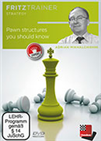Two wins and a draw
The fourth event of the Magnus Carlsen Chess Tour will come to an end either on Tuesday or on Wednesday (depending on the final reaching a tiebreaker or not). Soon afterwards, starting Sunday, the Grand Final will gather the four winners of each individual event. Daniil Dubov won the Lindores Abbey Rapid Challenge, while Carlsen won both the inaugural Invitational and the Chessable Masters — thus, the remaining two (or three) spots will be granted to the players who had better cumulative performances throughout the tour.
Given how things went on Friday, it is very likely that we will see Carlsen and Nepomniachtchi in the final of the ‘chess24 Legends of Chess’ tournament. They played straightforward, energetic chess to take down Svidler and Giri.

Click to enlarge
Carlsen 2½ : ½ Svidler
Playing black in game 1, Carlsen played the kind of move that we are likely to find in a club game between amateurs:
 In 60 minutes you will get a crash course how to play such a complicated opening like the Sicilian Najdorf by the hands of GM van Wely who knows by experience how the dangers look like! The contents:
In 60 minutes you will get a crash course how to play such a complicated opening like the Sicilian Najdorf by the hands of GM van Wely who knows by experience how the dangers look like! The contents:
• Video 1, 2, 3: how to survive versus whites most aggressive approach: 6. Bc4, 6. Be3 and 6 Bg5
• Video 4: how to deal with the latest fashion in the Najdorf 6. h3 and last but not least
• Video 5: how to play vs the more classical set ups 6. Be2 and 6. g3
15...g5 is a clear illustration of Carlsen’s play during the online tour — extremely confident on the board and during the interviews, he seems to be perfectly aware of his superiority over his colleagues. Anyone could guess that the computer does not like this sudden pawn push, but showing the refutation in a rapid game is never easy. Svidler failed to find the nice-looking continuation that would have maintained his advantage after 16.fxg5 Qxg5:
17.h4 was the way to go — if Black captures the pawn with 17...Qxh4 his queen will have trouble finding a good square after 18.Nf5 Qg5 19.Bc1, with White’s bishops ready to launch a killer attack. Svidler, a very dynamic player, would have probably found the move in a classical game, but here went for 17.Rf5, when Black gets to consolidate his position and swap the queens with a series of natural moves: 17...Qe3+ 18.Kh1 Ne5 19.Be2 Bb7 20.Qc2 Nc5 21.Bc1 Bxe4+ etcetera.
Five moves later, the eight-time Russian champion threw in the towel.
A 47-move draw followed — Svidler played the Sicilian with black, gave up an exchange for the initiative and went on to prove he had enough compensation to hold the balance. Carlsen got his second win of the day with the black pieces in game 3 to grab the first set.
Nepomniachtchi 2½ : ½ Giri
The matchup between Carlsen and Svidler finished much earlier than the other semi, mainly because Giri tried to win a rook endgame with 2v1 on the same flank until move 131 in the first encounter of the day!
Nepomniachtchi played white in game 2, and demonstrated that an army of well-coordinated pieces can overpower a queen:
 Every pawn structure has its typical plans and to know these plans helps you to find your way in these positions. On this DVD Mikhalchishin presents and explains the most common central structures: The Hedgehog, the Maroczy, Hanging pawns and the Isolani.
Every pawn structure has its typical plans and to know these plans helps you to find your way in these positions. On this DVD Mikhalchishin presents and explains the most common central structures: The Hedgehog, the Maroczy, Hanging pawns and the Isolani.
The Russian grandmaster knew that his queen would get trapped after 17.Qxh5 Bg4, but he also correctly assessed that his rooks would take control of the f-file, with his dark-squared bishop supporting them from the strong g5-outpost. Thus, 18.Qxg6 fxg6 19.Bxh6 Kd7 20.Ne3 Be6 21.Rf1:
White needed three more moves to double his rooks on the f-file and place his bishop on g5. The way in which Nepomniachtchi converted his advantage was quite instructive.
Game 3 was a wild Grünfeld. Giri castled queenside with white, obtained an advantage (according to the computer) in a complex open position, but ended up being outplayed by his opponent’s confident, energetic play. Nepomniachtchi won the game in 33 moves.
Links
























